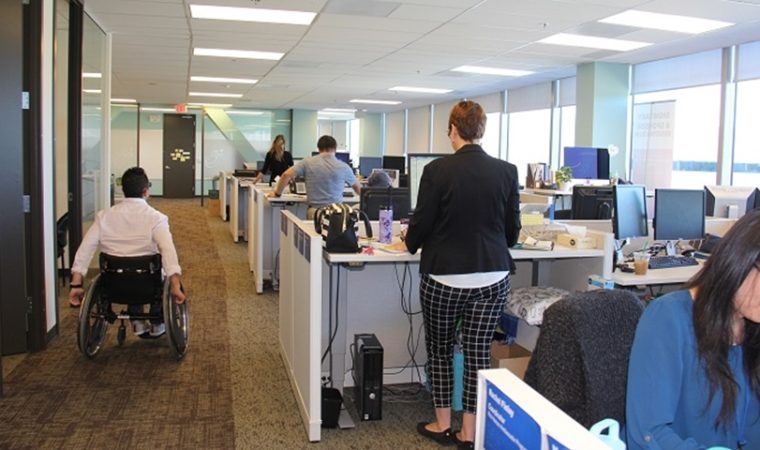Written by Mackenzie Saunders:
Working after sustaining a spinal cord injury can be difficult. There are a lot of barriers to employment when you have a spinal cord injury, such as struggling to find accessible transportation to work, or not being able to access your workplace due to the building’s inaccessibility. Luckily, there are many steps employers can take to best support their employees with spinal cord injuries.
It is essential that employers support their workers with disabilities as best they can, because holding a job can bring fulfillment, financial independence, and a sense of purpose to people with spinal cord injuries. Read below to learn the four main ways employers can support their workers with spinal cord injuries.
Allowing Flexible Workplaces and Work Hours
People with spinal cord injuries often have a longer morning routine than most. Getting out of bed, getting dressed, and commuting to a workplace can be difficult, and even tiring, for people with spinal cord injuries. Because of this, employers should allow their workers with spinal cord injuries to have flexible workplace locations: this means that employers should give their workers the opportunity to work remotely when necessary. Allowing workers with spinal cord injuries to work remotely as needed can help disabled workers tremendously, as this can limit exhaustion caused by getting ready and commuting to work.
Employers should also allow their workers with spinal cord injuries to have flexible work hours. Having a spinal cord injury can lead to many health complications, such as lack of bowel control and chronic pain. Because of this, workers with SCIs should be allowed to have more flexible work hours, meaning they should have the opportunity to leave work when they are experiencing health complications. Living with a spinal cord injury also means going to many doctors appointments to maintain your health. Employers should allow their workers with SCIs the chance to leave work and attend their necessary medical appointments.
Ensuring the Workplace is Accessible
A huge step employers must take to support their employees with spinal cord injuries is making sure their workplace is fully accessible. This means that the building should have an accessible entrance, accessible restrooms, accessible offices, and accessible office kitchens and facilities. If a workplace is inaccessible, workers with SCIs can experience a lot of difficulty while simply trying to do their job. To alleviate the stress of encountering inaccessibility in the workplace, employers should ensure that all parts of their workplace are fully accessible for people in wheelchairs and people with other disabilities.
Asking About Accommodations
To best support workers with spinal cord injuries, employers should ask their employees if they need any workplace accommodations to help them fulfil their positional duties. Asking for workplace accommodations can be stressful, leading many workers with disabilities to avoid asking for accommodations altogether. To combat this, employers should ask their workers if any accommodations would help them in the workplace. Additionally, if a worker with a spinal cord injury needs accommodations, employers should make sure to secure these accommodations quickly and properly. The proper workplace accommodations can help an employee with an SCI immensely in the workplace.
Making All Work Events Accessible
With employment comes different workplace events outside of the office, such as work happy hours and different recreational events. In order to fully include workers with spinal cord injuries, employers must make sure that all work events that take place outside of the office are fully accessible. Being excluded from work events due to inaccessibility can take an emotional toll on workers with disabilities; on the other hand, being included in work events outside of the office can bring a sense of inclusion, happiness, and fulfillment. To best support their workers with SCIs, employers must ensure that all locations for outside work events are accessible.
There are many barriers to employment for people with spinal cord injuries. Luckily, there are many steps employers can take to eliminate these barriers and support their workers with disabilities. Maintaining employment can be extremely beneficial to the wellbeing of people with disabilities; because of this, we need to make sure we are supporting employees with disabilities as best we can.

